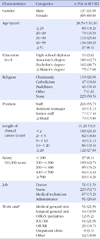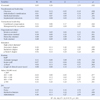Abstract
Purpose
The purpose of the study was to identify factors affecting the innovative behavior of general hospital professional staff.
Methods
In the final analysis, the study focuses on the 442 structured questionnaires received from the professional staff (doctors, nurses, medical technicians, and administrative staff) of H Hospital, a public medical foundation. Data were collected from August 1 to 31, 2014. The SPSS/WIN 19.0 program was used for data analysis which included t-test, ANOVA, Scheffé test, Pearson correlation coefficients, and multiple regression analysis.
Results
Multiple regression showed that factors affecting innovative behavior of hospital professional staff were conditional reward, innovation-oriented culture, education, and job (Adj R2=.317).
Conclusion
The results of this study suggest that it is necessary for the leader to demonstrate leadership with innovation and transaction in harmony to cultivate innovative behavior in hospital staff. Also, positive support and role in the hospital organization are fundamental to developing the strengths that each type of culture possess on the basis of the organizational culture of hospital, enabling hospital staff to exhibit their best voluntary innovative behavior.
Figures and Tables
Table 2
Degree of Leadership, Organizational Culture, and Innovative Behaviors of the Participants (N=442)

References
1. Sarros JC, Cooper BK, Santora JC. Building a climate for innovation through transformation. Leadersh Organ Stud. 2008; 15(2):145–158. DOI: 10.1177/1548051808324100.
2. Kang KH, Ko YK. Change commitment and learning orientation as factors affecting the innovativeness of clinical nurses. J Korean Acad Nurs Adm. 2013; 19(3):404–413. DOI: 10.11111/jkana.2013.19.3.404.
3. Scott JG, Bruce RA. Determinants of innovative behavior: A path model of individual innovation in the workplace. Acad Manag J. 1994; 37:580–607. DOI: 10.2307/256701.
4. Moon GW, Choi SB, Moon JS. Effects of leadership style and features of organizational culture on innovative behavior. J Ind Econ Bus. 2009; 22(6):3289–3320.
5. Han YJ, Lee SG, Kwon HJ. Influence of organizational culture type and job satisfaction on nurses' innovation behavior in a university hospital. Korean J Hosp Manag. 2010; 15(4):63–77.
6. Ko YK, Yu SY, Kang KH. Organizational culture and organizational support as factors affecting the innovative behaviors of general hospital nurses. J Korean Acad Nurs Adm. 2015; 21(2):223–231. DOI: 10.11111/jkana.2015.21.2.223.
7. Kim JS, Park JC. The multi-level analysis on the causal relationship among organizational culture, psychological capital, and organizational commitment. J Hum Resour Manag Res. 2013; 20(3):51–74.
8. Lee HJ, Kim KJ. Hospital innovation with a focus on organizational identity. Korean J Bus Adm. 2012; 25(4):2139–2156.
9. Choi SB, Kim JE, Chang SD. The Effects of empowering leadership on the innovative behavior; Creativity as a mediator and innovative support as a moderator. J Hum Resour Manag Res. 2013; 20(3):209–229.
10. Lee HS. The relationship between workers' knowledge sharing and innovation behavior in general hospitals. Korean J Health Serv Manag. 2013; 7(4):233–241.
11. Moon IO. The effect of knowledge sharing on innovative behavior and organizational commitment in clinical nurse. J Korean Acad Nurs Adm. 2005; 11(2):1–11.
12. Min S, Shin CH, Shin MG. The effect of a university hospital nurses' trust in supervisor, organizational trust and perception on the shared value on innovative behavior. Korean J Hosp Manag. 2014; 19(4):89–98.
13. Moon JS. Effects of leadership and organizational culture on innovative behavior. [master's thesis]. Daegu: Kyungpook National University;2007.
14. Bass BM, Avolio BJ. MLQ multifactor leadership questionnaire. Redwood City, CA: Mind Garden;1995.
15. Kim MS, Han SJ, Kim JH. The development of the nursing organization culture measurement tool. J Korean Acad Nurs Adm. 2004; 10(2):175–183.
16. Cameron KS, Quinn RE. Diagnosing and changing organizational culture: based on the competing values framework. New York: Addison-Wesley Inc;1999.
17. Kong TH. The relationship between the leadership and organizational effectiveness: Focused on the hospitals and medical clinics in Busan. Korean Public Health Res. 2013; 36(1):51–61.
18. Ko SL. The effects of transformational and transactional leadership on the followers' innovative behaviors: Mediating role of goal orientation. J Organ Manag. 2011; 35(1):1–21.
19. Choi CK, Park YC. A study for inter and intra heterogeneity of organization. Korean J Hum Resour Dev. 2012; 15(1):1–29.
20. Kim CE, Park DS. Organizational culture, the relationship between leadership and organizational innovation and organizational performance. Korea Bus Manag Assoc Conf 2014 integr. 2008; 1–40.
21. Lee KS, Lee MH. Functional departments cognitive types of organizational culture and organizational effectiveness in the general hospital. J Ind Econ Bus. 1998; 11(1):5–26.
22. Quinn RE, McGrath MR. The transformation of organizational cultures: A competing values perspective: A competing values perspective. In : In Frost PJ, Moore LF, Louis MR, Lundberg CC, Martin J, editors. Organizational culture. Beverly Hills: Sage Publications;1985. p. 314–334.
23. Lee JW, Kim JW, Kim IC. Psychological empowerment, organizational supports, and innovative work behavior of general hospital employees. Korean J Health Policy Adm. 2003; 13(1):46–68.
24. Bass BM. Leadership and performance beyond expectations. New York: Free Press;1985.




 PDF
PDF ePub
ePub Citation
Citation Print
Print






 XML Download
XML Download